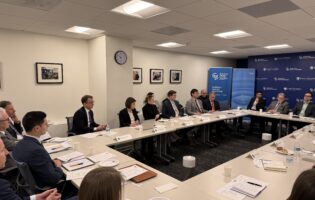Influencing States’ Decisions to Acquire Nuclear Weapons: The U.S. and German Approach to Nonproliferation
The end of the Cold War brought relief to the international community living in fear of a nuclear world war. However, the great efforts for international nuclear nonproliferation have since seen some roll backs. The AGI seminar “Influencing States’ Decisions to Acquire Nuclear Weapons: The U.S. and German Approach to Nonproliferation” features presentation from Dr. Antje Nötzold and discussion on the topic of international nuclear nonproliferation. Dr. Nötzold’s presentation was based on a categorization of assumed causes and motivations for states to acquire nuclear weapons as well as incentives and constraints.
Dr. Nötzold gave a brief introduction of the spectrum of factors influencing state’s decisions to either pursue nuclear technologies or renounce nuclear ambitions. While some states gain international status by acquiring nuclear technologies or even nuclear weapons, others may achieve international status by renouncing their preexisting nuclear capacity. There are also lessoned to be learned from the roll-backs of nuclear nonproliferation in the past. Eliminating perceived threats in national security, changing ideologies of ruling elites, promoting civilian governance and democracy, and integrating states into the broader international regime of trade and security are all viable and important means to lead states toward nuclear nonproliferation.
Dr. Nötzold further explained her research findings on the differences in the United States’ and Germany’s approaches to nuclear non-proliferation. While the U.S. is more willing to use military intervention as a strategy to urge states to comply with NPTs, Germany emphasizes the utilization of diplomatic communication, and regards military intervention as a last resort solution. In her recommendation for a more coherent approach to global nuclear nonproliferation, Dr. Nötzold suggested that the international community should adopt a new consensus on nuclear nonproliferation and cooperate through international regimes to encourage nonproliferation efforts worldwide. Using Iran as an example, she suggested that the current leadership in the U.S. and Iran, under Barack Obama and Hassan Rouhani, respectively, together with the incentive for Iran to participate in the international economic regime to release itself from tough Western sanctions, could possibly move the nuclear negotiation forward.
In the discussion following the presentation, participants raised some constructive points on further exploring the topic of nuclear nonproliferation. Some suggested that private corporate and commercial interests should be taken into consideration when evaluating states’ decisions to pursue nuclear technology or transfer of nuclear technology. Some other participants also brought up the idea that regional partners and state-specific interests are also very important in examining external influence in states’ decision to pursue nuclear nonproliferation.
| DATE: | Friday, October 25, 2013 |
| TIME: | 12:00pm – 1:30pm |
| LOCATION: | AGI |
| 1755 Massachusetts Avenue, NW, Suite 700 | |
| Washington, DC 20036 |
Please contact Kimberly Frank with any questions at kfrank@aicgs.org.







